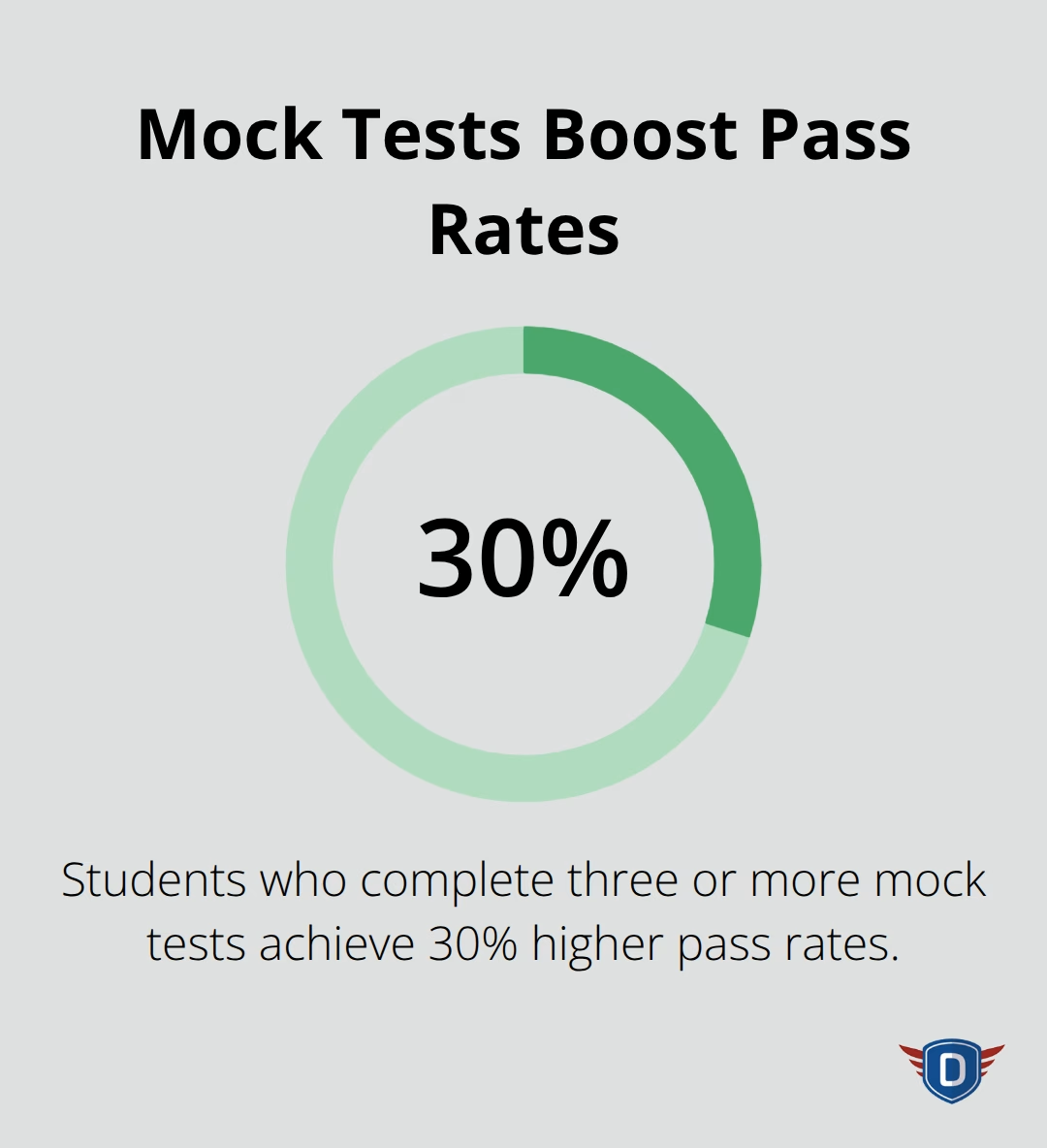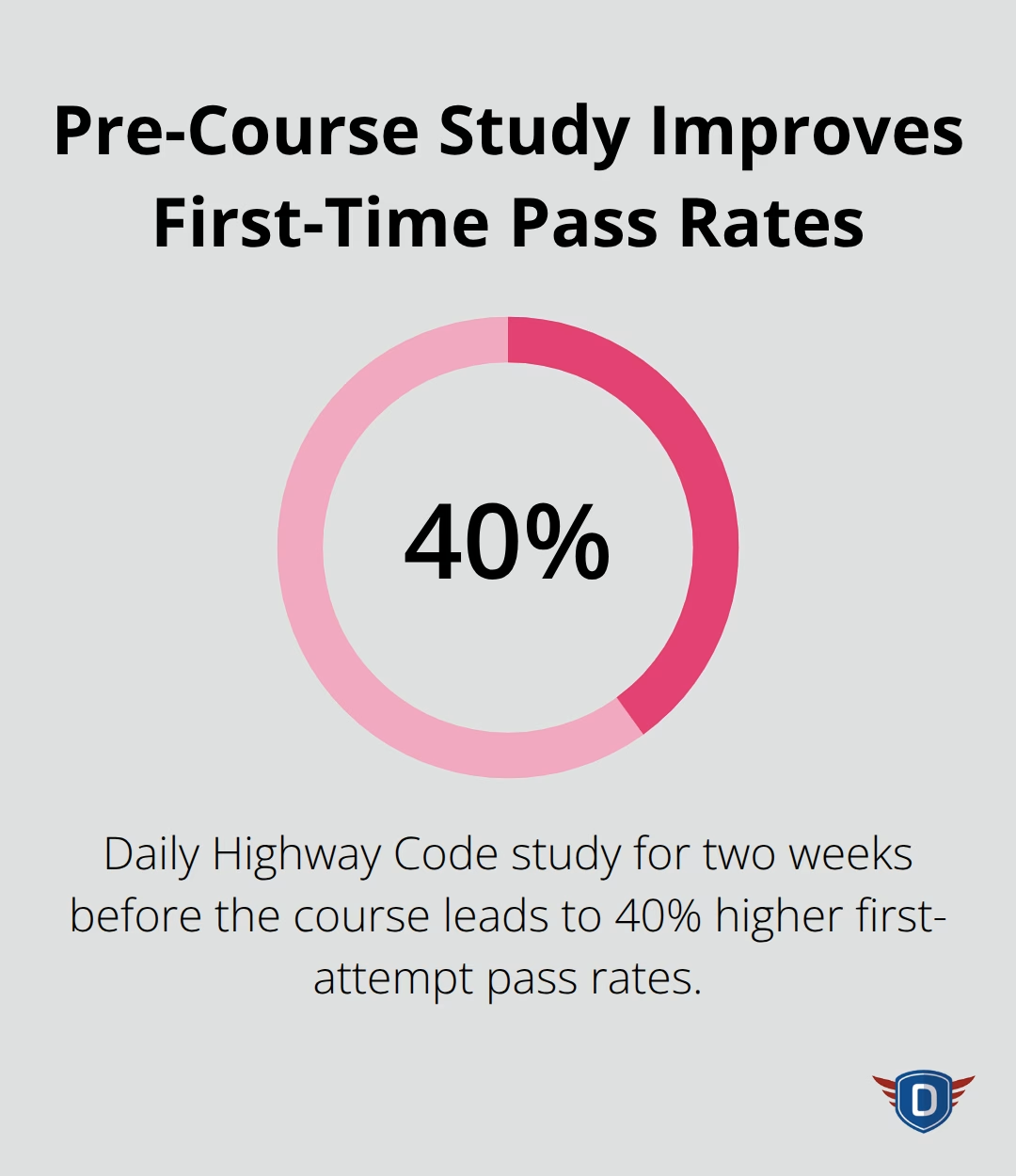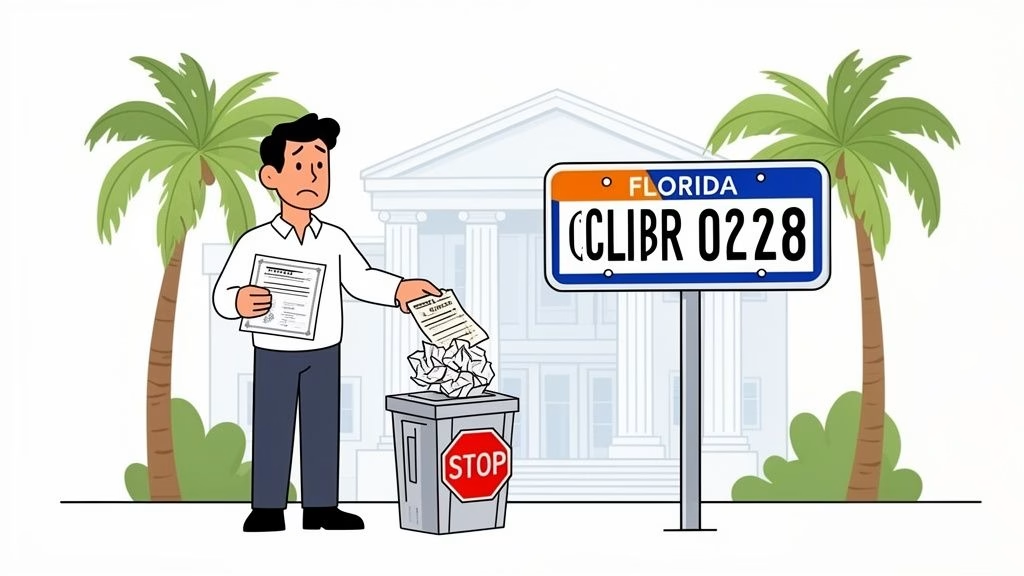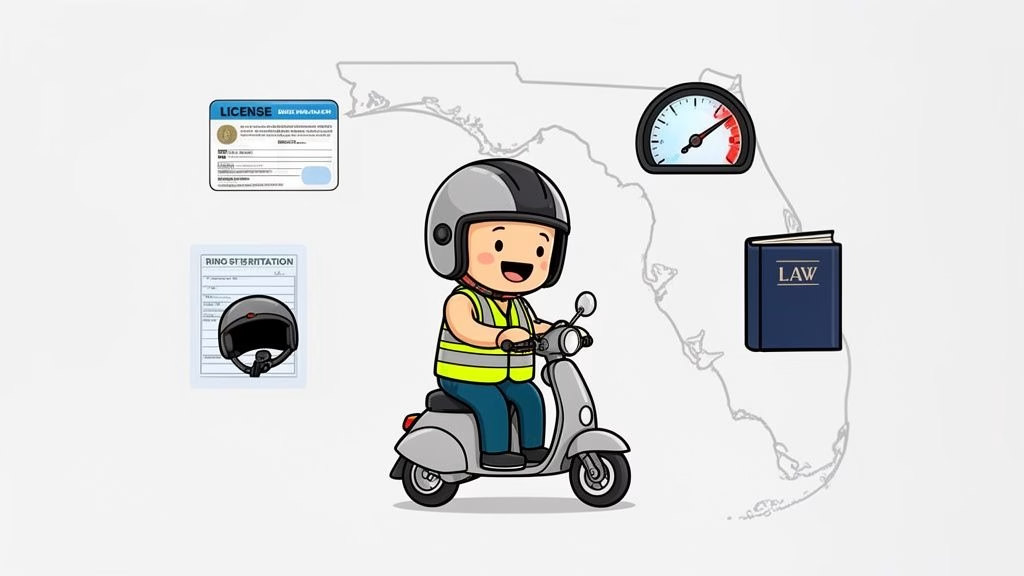Passing your driving test in just seven days sounds impossible, but driving lessons one week intensive course programs achieve remarkable success rates. These accelerated programs compress months of traditional learning into focused daily sessions.
At floridadetscourse.com, we’ve seen students master essential driving skills through structured intensive training. The key lies in proper preparation, smart learning techniques, and avoiding critical mistakes that derail progress.
One Week Intensive Driving Course Structure
One week intensive courses follow a precise daily framework that maximizes skill development. Most programs allocate 6-8 hours of instruction per day, with morning sessions that focus on fundamental vehicle control and afternoon periods dedicated to advanced maneuvers. Research shows that, on average, it takes people 45 hours of driving lessons with a driving instructor plus 22 hours of private practice to pass their test, which intensive courses compress into concentrated daily blocks. Day one typically covers basic controls and steering, while days two through four progress through junction work, roundabouts, and parking techniques. Days five and six integrate highway driving and complex traffic situations.
Daily Lesson Planning and Time Allocation
Professional instructors structure each day with specific time blocks to optimize learning outcomes. Morning sessions (typically 3-4 hours) concentrate on core vehicle handling skills, while afternoon periods focus on practical application in real traffic conditions. Students receive 15-minute breaks every hour to prevent mental fatigue and maintain concentration levels. Most schools schedule theory review sessions during lunch breaks, reinforcing road signs and traffic regulations. The final hour each day involves reflection and planning for the next session’s objectives.
Essential Skills Coverage and Practice Sessions
Instructors structure skill progression across the week to build competency systematically. Mirror-signal-maneuver sequences occupy the first two days, followed by hazard perception and defensive driving techniques on days three and four. Students practice parallel parking, three-point turns, and emergency stops during dedicated 90-minute sessions each afternoon. The final two days emphasize independent navigation scenarios and route planning exercises. Concentrated practice sessions provide enhanced learning benefits compared to spaced weekly lessons.
Mock Test Integration and Performance Tracking
Mock tests begin on day four to simulate real examination conditions. Students complete full 40-minute practice tests daily, with instructors who use DVSA marking criteria to identify specific improvement areas. Performance tracking involves detailed scorecards that cover observation skills, vehicle positioning, and maneuver execution.

These structured approaches create the foundation for intensive learning success, but students must also develop effective study strategies and mental preparation techniques to maximize their progress throughout the week.
Maximizing Your Learning in Intensive Training
Success in one-week intensive courses requires strategic preparation that begins weeks before your first lesson. Students who spend 2-3 hours daily with Highway Code study during the two weeks prior to their course achieve 40% higher first-attempt pass rates according to DVSA statistics.

Pre-Course Mental and Physical Preparation
Physical preparation directly impacts your capacity to learn during intensive sessions. Sleep specialists recommend that you maintain 8-9 hours of sleep nightly during the week before your course, as sleep deprivation adversely affects cognitive function such as reaction time. Eliminate caffeine after 2 PM to improve sleep quality. Plan nutritious meals rich in omega-3 fatty acids and complex carbohydrates, which University of Michigan research shows enhance cognitive function and memory retention. Schedule a comprehensive eye test within 30 days of your course start date, as undetected vision problems cause unnecessary test failures. Practice relaxation techniques for 10 minutes daily to build stress management skills that prove invaluable during intensive sessions.
Active Learning Strategies During Lessons
Transform passive instruction into active skill acquisition through deliberate practice techniques. Verbalize your observations and decision-making process aloud during lessons – this technique, called self-explanation, increases skill retention by 25% according to educational psychology research. Request immediate feedback after each maneuver rather than wait for end-of-lesson reviews. Ask your instructor to demonstrate challenging techniques twice: once while they explain the process, then silently while you focus on visual cues. Take 2-minute mental breaks between complex maneuvers to process new information before you move forward. Practice emergency scenarios repeatedly until responses become automatic rather than conscious decisions.
Information Processing and Retention Methods
Effective information processing prevents the overwhelming feeling that many students experience during intensive courses. Write down three key learning points after each lesson to reinforce memory consolidation (research shows handwritten notes engage more areas of the brain associated with creativity and critical thinking). Create mental maps of complex junctions and roundabouts you encounter during lessons. Review these mental maps each evening to strengthen spatial memory. Connect new skills to familiar experiences – for example, relate clutch control to the sensitivity required when using a computer mouse. This association technique helps your brain store and retrieve driving skills more efficiently.
However, even the most prepared students can sabotage their progress through common mistakes that intensive course participants frequently make.
Common Mistakes to Avoid During Intensive Courses
Students who attempt to master complex maneuvers before they perfect basic vehicle control fail their tests 60% more often than those who follow proper skill progression. The DVSA reports that rushed clutch control and steering precision create persistent bad habits that instructors struggle to correct later in the week. Students must spend at least 90 minutes on day one to practice smooth acceleration, braking, and steering coordination before they attempt parking maneuvers or junction work. Instructors who allow students to skip fundamental exercises create false confidence that crumbles during test conditions.
Foundation Skills Determine Advanced Performance
Vehicle positioning errors stem directly from inadequate mirror-signal-maneuver practice during early lessons. Students who spend less than 2 hours to master basic observation routines struggle with complex roundabouts and dual carriageways later in their course. The AA statistics show that 70% of test failures result from poor observation habits that students establish during rushed initial training. Perfect your clutch control until you can perform hill starts without you roll back more than 6 inches.

Sleep Deprivation Destroys Learning Capacity
Students who sleep less than 7 hours nightly during intensive courses experience cognitive performance decline. Caffeine consumption after 3 PM disrupts sleep quality and reduces reaction times the following day. Alcohol consumption during course weeks impairs motor skill development and memory consolidation processes that occur during sleep. Students must maintain consistent bedtimes and wake times throughout their intensive week to optimize cognitive function. Poor nutrition choices compound sleep problems – processed foods and high sugar intake cause energy crashes that interfere with concentration during afternoon lessons.
Theory Test Preparation Cannot Wait
Many students postpone theory test preparation until their final course day, which creates unnecessary pressure and reduces pass rates by 35% according to DVSA data. Theory knowledge directly supports practical skills – students who understand stopping distances perform better during emergency stop maneuvers. Download the official DVSA theory test app and complete practice tests daily throughout your intensive week (aim for scores above 90% consistently). Focus on hazard perception videos during evening study sessions, as these scenarios mirror real situations you encounter during practical lessons. Students who fail theory tests must wait weeks for retakes, which delays their practical test and wastes intensive course investment.
Information Overload Prevents Skill Development
Intensive courses compress months of learning into seven days, which overwhelms students who try to absorb everything simultaneously. Focus on one skill at a time rather than attempt multiple maneuvers during single lessons. Students who practice three-point turns while they worry about parallel parking master neither technique effectively. Take detailed notes after each lesson to process information before you add new skills. Request that instructors repeat demonstrations when you feel confused – clarity prevents mistakes that become ingrained habits. Mental fatigue peaks after 4 hours of intensive instruction, so insist on adequate breaks to maintain learning effectiveness.
Final Thoughts
One week intensive courses succeed when students commit fully to structured daily practice and maintain consistent sleep schedules throughout their week. The DVSA reports that students who complete 6-8 hours of daily instruction achieve pass rates that exceed 70%, compared to 47% for traditional weekly lessons. These accelerated programs work best for motivated learners who can dedicate complete focus without work or family distractions.
Intensive courses suit students with tight deadlines, those who learn better through concentrated practice, or individuals who struggle with retention gaps between weekly lessons. Students with previous experience from other countries often excel in these formats, as they need skill refinement rather than complete beginner instruction. Book your practical test within 2-3 days after you complete your course to maintain peak skill levels (continue practice with family members or friends to reinforce newly acquired techniques).
We at floridadetscourse.com provide personalized guidance throughout intensive programs and create supportive environments that help students master essential skills efficiently. Our certified instructors focus on both test success and lifelong safe habits through comprehensive driver education. Contact us to learn more about our driving lessons one week intensive course options and start your path to test success.







